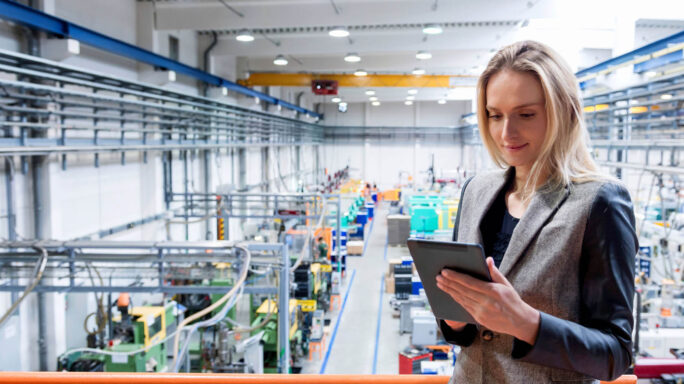Don’t let outdated ERP send your company backwards

If you read nothing else:
- In times of disruption, resilience is key to success, but legacy tech stands in the way of digital transformation and prevents process manufacturers from managing quality, inefficiency, and the threat of costly recalls and associated reputational repercussions.
- Modern ERP is the foundation of digital transformation. They offer robust, innovative, responsive, and intelligent approaches to address your business challenges.
- Investment-intense assets, concerns over ROI, lack of skills, and confusion about market offerings prevent manufacturers from upgrading their ERP systems.
- A new generation of Intelligent ERP (iERP) can become central to operational processes in the manufacturing industry, helping companies trace the entire supply chain and all information relating to their products.
- An iERP can enable end-to-end visibility across your distribution value chain.
COVID-19 fast-tracked the need for digital transformation across industries. The manufacturing sector is no exception. Many businesses are under pressure to evolve their production systems for greater operational speed and agility but are not doing so fast enough.
Hesitant leadership is a major stumbling block to addressing outdated IT infrastructure. Given the vast array of ever-changing digital solutions, this hesitance is somewhat understandable. However, manufacturers need to be aware of the costly repercussions associated with the continued use of outdated, legacy technologies and consider the business benefits of next-generation production systems such as intelligent ERP.
Can you monitor your value chain in real-time?
The inability to track and trace your manufacturing operations – from sales to production to delivery – can become a costly problem.
Your value chain comprises many moving parts such as materials, actions, dates, compliance issues, and suppliers that all need to work together. Outdated production systems typically silo data into departments, which prohibits transparency and can result in errors. Minor mistakes can be absorbed, but they do add up. And more significant issues, like an inventory stocked with surplus supply that does not meet changing customer demands, can have enormous consequences on your business’s market share and reputation.
The reality is there’s no room nor reason for errors, big or small, at any point along your value chain. A factory or production site that employs advanced technologies benefits from full traceability. Traceability is a vital component of modern manufacturing as it empowers managers with the right information at the right time. Armed with easy access to crucial data, managers can trace key metrics across the value chain such as productivity, inventory, booked versus billed and continuous production versus batch without missing a beat. All in all, inefficiencies and errors are reduced, which lowers unnecessary costs and delays. The upshot is that you can meet your customers’ needs faster, which boosts your reputational value.
Does your data work for you?
The manufacturing sector consumes more and more information than ever before. However, the acquisition of big data is not particularly impressive. Its true value lies in how it is mined for insights, shared in real-time, and then put to use.
One problem with old technologies is that they dump data in siloes where it gathers dust. As a result, employees, suppliers, and other value chain stakeholders cannot access or cross-correlate up-to-date information and insights; they end up looking backwards. What’s more, they invariably resort to time-consuming manual processes in frustrated attempts to fill gaps.
The right next-generation ERP system can close any information gaps and keep your entire value chain on the same page with current data. Not only that, it performs relevant data analysis to extract the valuable insights that inform competitive action. The results are irrefutable: data accessed in real-time and applied intelligently to business processes significantly improves the quality of the buying experience and value delivered to customers.
Are you confident you can move forward on your digital transformation journey with your current ERP system?
Factories of the future will be defined by one critical characteristic: digital optimisation. Today’s manufacturers need to embolden their businesses with the right technology for ongoing sustainability.
According to recent Sage-sponsored IDC research, at least 40% of companies worldwide are burdened with outdated legacy systems, heavily customised applications, and ‘financial’ ERPs. These old-school production systems focus primarily on financial transactions but fail to align the finance function with other core value chain functions. This obstructs an organisation’s ability to monitor its supply chain in real-time, delays its customer response rates, and hinders its competitive agility.
Ultimately, the volume of archaic ERP heritage has created a tangle of technical debt that prevents companies from moving forward in their digital transformation journeys. However, rather than holding onto their legacy systems, hoping that a technical tweak here or there will make all the difference, manufacturers are urged to start their digital evolutions now.
Legacy tech cannot offer your business collaborative or social networking-style features to increase productivity. It does not support your increasing need to make fast, well-informed decisions in a global context. Antiquated ERP systems are unable to provide your business with a sustainable competitive advantage that can withstand current disruption as well as future shocks.
Have you considered Intelligent ERP?
Intelligent ERP systems use modern technologies such as AI, IoT, and machine learning to turn reams of data into actionable intelligence. These modern production systems learn on the job and apply this contextual knowledge to inform better business practices and processes for better business outcomes. An intelligent ERP system transforms siloed operations into a collective, collaborative organisation that can meet customer demands on time, every time.
As the world grapples with ongoing uncertainty, manufacturers cannot afford the increasingly costly repercussions of not tracking and tracing their product data. Therefore, harnessing digital intelligence is the only way to build and maintain a sustainable manufacturing advantage.
The right technologies for your business needs will help you address operational challenges by building operational performance, reducing costs, and improving quality control. The factories of the future are smart, digitally savvy, and optimised with advanced tech that is agile enough to keep up with changing market environments. You can choose to either stay put and move backwards – or step forward and take control of your value chain.








Ask the author a question or share your advice